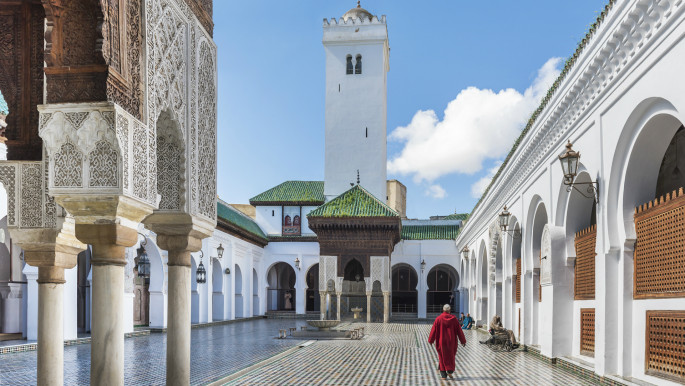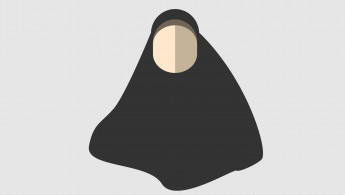It's time to read about the untold history of revolutionary Muslim women
The modern narrative of Muslim women often forgoes the idea that these women were empowered and changed the world long before they existed in the West or in the last century.
With the diversity and representation drum being pounded louder, and capitalism sinking its claws in deeper, many – within our communities and outside of them – firmly believe that empowerment has come with modernity.
However, this ignorance is not a fault of the masses, but of the few who control which narratives become mainstream and which don't, as well as which narratives live on in the history we learn, and which don't.
There is also a wide gap in the way the history of Muslim women has and has not been recorded.
Sadiya Ahmed, founder of Everyday Muslim, a site that works to document Muslim history and heritage in the UK, believes that there is a lack of historic records of the narratives of Muslim women.
 |
|
| Read more special coverage on International Women's Day |
"This erodes their individual and collective identity as well as their contribution to society," she tells The New Arab.
Her main concern is that Muslim women are absent from every main women's archive collection in London.
"This perpetuates the exclusion of their narratives," Ahmed adds.
Kiran Sahota, who is working on a project funded by the Heritage Lottery Fund to uncover the role of Indian Women in the Second World War, told The New Arab, "In-depth research is needed and many records have been lost so it's not easy to recognise who was Muslim and who wasn't.
 |
There is a lack of historic records of the narratives of Muslim women |  |
"This is why our project focuses on Indian women pre-partition. The most famous Muslim woman from our research is Noor Inayat Khan."
Noor Inayat Khan was a Special Operations Executive (SOE) and the first female wireless operator sent from Britain into occupied France. She was awarded the George Cross by Britain and the Croix de Guerre by France posthumously for her bravery.
Khan evaded capture and escaped twice before being executed. She is one of the few Muslim women recognised in this way and was integral to the war efforts.
Muslim women that came before those today who are breaking boundaries and stereotypes must not be forgotten.
We have seen the likes of Malala Yousafzai challenge extremists who stopped her from getting an education, Ibtihaj Muhammad competing as a hijabi Muslim woman in the Olympics, Halima Aden walking multiple runways and making a mark in the fashion world, as well as Ilhan Omar, becoming the first Somali woman in Congress.
This thread of empowered women stands on the shoulders of Muslim women before them who changed history and the world, but have long since been left in the shadows and unturned pages, brushed aside and not remembered in the honourable way they should be.
These untold narratives are not irrelevant and their erasure must be acknowledged by those of us who seek empowerment in our present – especially as Muslim women are constantly confronted by the limitations of their lack of privilege and told they are powerless.
Rebelling, truth-telling, revolution starting, and boundary-breaking have all been a part of Muslim women's truth since the inception of Islam, and it would be a disservice to not tell these stories, even if there are only pieces of the entire story.
 |
Rebelling, truth-telling, revolution starting, and boundary-breaking have all been a part of Muslim women's truth since the inception of Islam |  |
Often when we do speak of Muslim women in history the wives of the Prophet Muhammad are mentioned, notably, Khadija Bint Khuwaylid who is known for being the richest merchant of her time and for her independence, and Aisha Bint Bakr who was known for her strong personality and prominence in society, politics and even fighting on the battlefield during war.
Muslim women are scattered across the history of time, here are only a few you may not know about:
 |
|
| Read also: Morocco's al-Qarawiyyin library: Renovating a hidden cultural masterpiece |
Fatima Al-Fihri is known for opening the first University in the world in Morocco in 859 CE. Yes, a Muslim woman created the model for higher education.
Most of the records around Al-Fihri are lost but we know that she came from a wealthy merchant family who valued education. In the beginning, the institution only offered religious studies but later went on teaching mathematics, medicine, and astronomy.
Al-Fihri's legacy lives on the in the modern-day higher education institutions we see today but also in the original University she established: Al-Qarawiyyin still living on today.
Similarly, Nana Asma'u, a revered figure in Nigeria, was a princess, poet, teacher, and daughter of the founder of the Sokoto Caliphate in the 18th century. She was known to be an advocate for education and empowering Muslim women in Islam.
Shajar Al-Durr was a ruler in Egypt who, after her husband's death, ruled in her own name. She stopped the seventh crusade, capturing King Louis of France and ransomed him back to his own country for five-trillion US dollars, about 30 percent of France's total revenue.
She orchestrated all of this in secret because if it was found out her husband was dead, Egypt would have become more vulnerable.
Raziya al-Din, also known as Razia Sultana, is arguably a more noted Muslim figure in history. She is known to be the first female Muslim ruler in South Asia in the 13th century.
Begum Hazrat Mahal, born in India in the early 19th century, was the wife of Nawab Wajid Ali Shah whose kingdom was protected by the British under the treaty but was later massacred.
After her husband was exiled, Hazrat Mahal rebelled against the British India company during the Indian rebellion of 1857. She actively organised an army of women and revolted, eventually having to seek asylum in Nepal when Lucknow was lost.
Sayyida Al-Hurra was a pirate Queen in the early 16th century during the Corsair era, allying with Turkish pirates.
She ruled even after her husband died, raiding the Mediterranean for 30 years, targeting Portuguese and Spanish shipping lines.
In 1540, she was part of an enormous pirate raid of Gibraltar in which pirates filled their ships with valuables and slaves.
Another key figure is Khawla bint al-Azwar, a warrior, military leader and nurse during the time the Prophet Muhammad was alive.
She fought alongside her brother Dhiraar Bin Azwar and even saved his life more than once, singlehandedly rescuing him when he was captured by the Byzantine army and taken to prison. The Al-Iraqi all-women unit in the UAE's first women's college is named after her.
Bareerah, was married to Mugeeth in the time of the Prophet, but later chose to divorce her partner. Even after grand gestures were made by her ex-husband and the Prophet interceded in an attempt to bring the marriage back, Bareerah stood true to herself and was the final authority on who she loved and didn't love.
Her story is a demonstration of the autonomy Muslim women hold in their decisions, especially when it comes to marriage and love.
All these women created an impact that lives on in the world around us and much strength can be taken from their achievements and efforts. So this International Women's Day, let's celebrate the women of yesterday too.
Mariam Khan is a British writer and activist. She is the editor of It's Not About the Burqa, an anthology of essays by Muslim women.
Follow her on Twitter @helloiammariam



